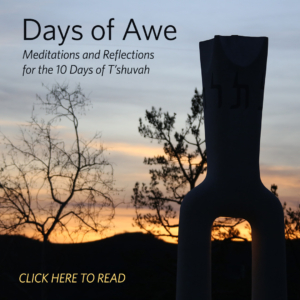From now through Yom Kippur, each of our Daily Kavanot will feature a piece written by our clergy on the themes and traditions of the High Holy Days. Each of these pieces can be found in Days of Awe, our High Holy Day Machzor supplement.
Turn and Return
On Tisha B’Av, when we come to the end of the Book of Lamentations, a strange thing occurs. Perhaps you have heard of it, perhaps not, but as the final verse is chanted in its plaintive tune, the entire community goes back to repeat the penultimate verse:
הֲשִׁיבֵ֨נוּ יְהֹוָ֤ה ׀ אֵלֶ֙יךָ֙ (ונשוב) [וְֽנָשׁ֔וּבָה] חַדֵּ֥שׁ יָמֵ֖ינוּ כְּקֶֽדֶם׃
Return us to You, Adonai, and we will return
Renew our days as of old!
The custom exists because we, as a people, believe in a nechemta—the redemptive power of hope. We are taught, generationally, that we do not end a reading or a teaching on a negative note or on a note of despair. So, to end with the final verse of the Book of Lamentations would leave us in the pit, in the deepest sadness. Instead, we close the reading—and the commemoration—with a bit of light, allowing hope and a path forward to shine out, moving us from despair into comfort.
 The repetition is also a liturgical statement. Not only does this custom—and the text itself—respond to the emotional needs of the moment, but it is also meant to set us up for what comes next. Because, of course, Tisha B’Av marks the lead-up to the High Holy Days; the Shabbatot of Consolation count seven weeks. And, of course, the language of that penultimate verse is the language of t’shuvah, of turning and returning, of renewing our commitment to ourselves and to the Divine. This work is the central focus of the High Holy Days, and the central focus of these pages.
The repetition is also a liturgical statement. Not only does this custom—and the text itself—respond to the emotional needs of the moment, but it is also meant to set us up for what comes next. Because, of course, Tisha B’Av marks the lead-up to the High Holy Days; the Shabbatot of Consolation count seven weeks. And, of course, the language of that penultimate verse is the language of t’shuvah, of turning and returning, of renewing our commitment to ourselves and to the Divine. This work is the central focus of the High Holy Days, and the central focus of these pages.
Beginning on Rosh Hashanah, the countdown from Tisha B’Av is over and a new one has begun. Friday begins the Aseret Yamei T’shuvah, the 10 Days of Repentance, or the 10 Days of Turning. From then until Yom Kippur, we are meant to engage in the work of t’shuvah—of turning and returning, of repentance and repair. Over these pages, you will find reflections from your rabbis and cantors and from the pages of our machzor, our High Holy Day prayer book. We hope that these words will inspire you, anchor you, and comfort you, perhaps illuminating a path forward for these days or for the year ahead.
Shanah Tovah—may it be a good year for all of us.
—The Clergy of Stephen Wise Temple
